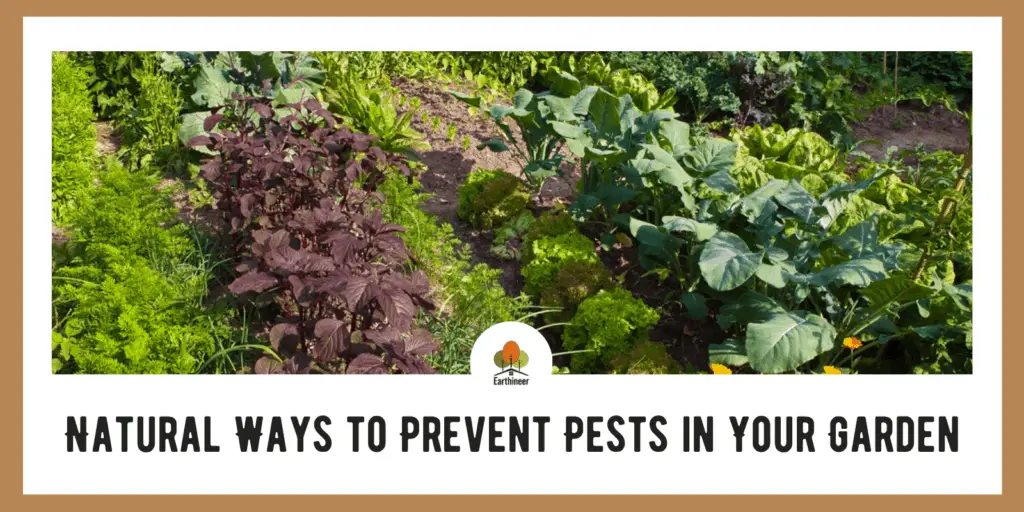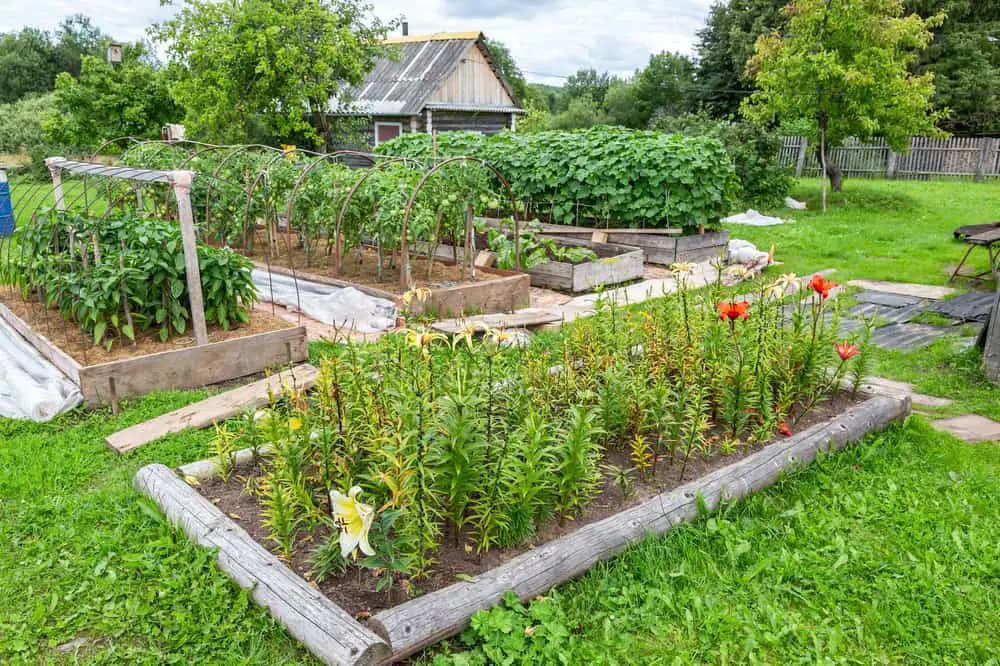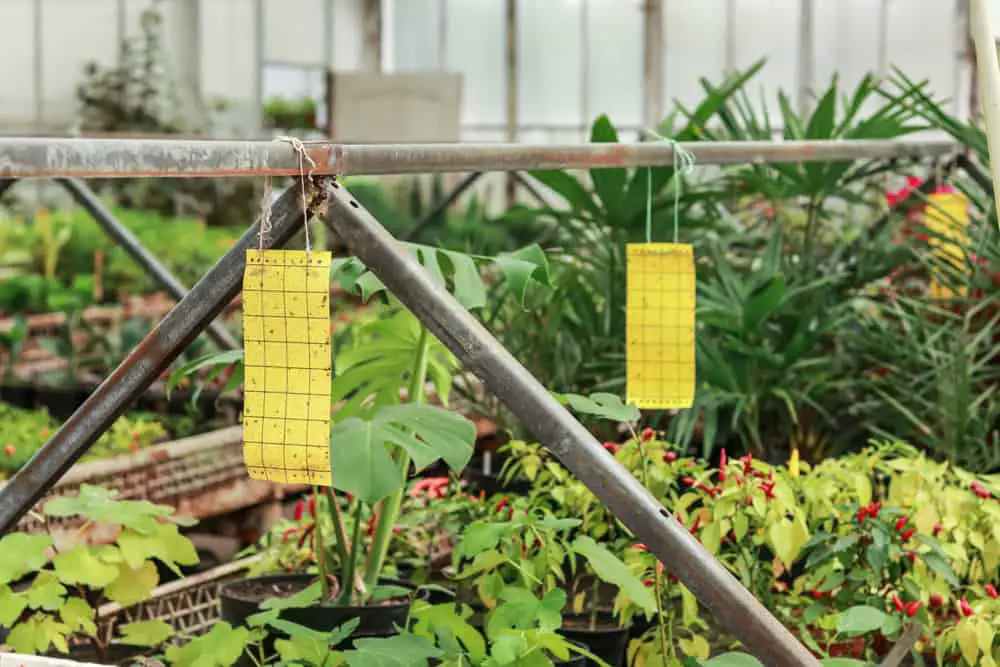A homesteader’s priority is (or should be) to maintain a healthy and productive garden.
There’s not anything more disheartening than witnessing your hard work go to waste as a salad bowl for numerous bugs and pests. There is, however, a solution.
To cultivate the best crops and enjoy nutritious and fresh food, you must take preventative actions to minimize garden pests.
I have personally witnessed large gardens get destroyed because of poor pest control. Believe me when I declare this is the last thing you want to happen on your homestead.
In this article, we’ll go through seven techniques to keep pests from overrunning your garden this season so that you can have a prosperous year.
7 Natural Ways to prevent pests in your Garden
1: Healthy Soil
Healthy soil, like a strong immune system in humans, provides the cornerstone for growing healthy plants.
It defends the plants against various hazards such as bugs, pests, and weeds, allowing them to remain strong and healthy.
Natural fertilizers made from fish and seaweed help build healthy soil by activating soil microbes and adding vitality to the soil.
The heat will build up underneath if you cover the garden with black plastic for six months to help control it and kill pests and their eggs, weeds, parasites, and other microorganisms.
2: Clean Garden
To develop healthy crops, the environment in which they are grown must be clean and well-organized.
Wilted plants and mounds of decaying and dead leaves provide the ideal breeding grounds for garden pests and parasites to thrive.
Weeds, for example, compete fiercely for resources such as water, light, and nutrients. Bugs, garden pests, and parasites can all find a home in them.
That’s why it’s critical to “nip the weeds in the bud” before they become a major problem. Pluck off diseased leaves and collect garden litter immediately.
3: Attract Beneficial Insects
Beneficial insects like ladybugs can be valuable for a homesteader to fight against harmful organisms.
They target pests, bugs, and parasites dangerous for crops since aphids and mites are some of their favorite snacks. They’re often naturally drawn to gardens in search of nectar or pollen.
Encourage them to stick around by planting flowers and perennials such as comfrey, sunflowers, and yarrow, which can provide their nutritional demands.
If all of their requirements are answered, they will lay eggs and start a family while also assisting you by providing a parasite-fighting army.
4: Floating Row Covers
Row covers are used to protect crops. They’re lightweight, enabling water and light to pass through while keeping pests at bay.
If you have a problem with pests regularly, consider using low-tunnel hoops.
While these are permanent, make sure you lift the tunnel cover every morning for a few hours to allow pollinators through.
5: Interplanting
Interplanting is a plantation technique that involves planting diverse crops, herbs, and flowers in an alternating sequence to confuse pests.
Pests prefer monocrops to multi crops. Monocropping is the manner of producing only one type of crop year after year.
Because of this, industrial farms use lots of pesticides. Their crops are sprayed heavily with them.
When planting your crops, the best method is to alternate rows of vegetables with rows of beneficial insects and pest-repelling herbs and flowers.
6: Insect Traps
Insect traps are used to kill or catch insects to minimize the number of insects in a community. They prevent crops from being sick by eliminating insects that hinder their development.
They are commonly available in all garden centers and are very cost-effective.
Typically, they are situated between the plant’s shoots and branches. If you use them in this way, they will help you catch pests in your garden.
Garden centers will help you in identifying harmful bugs and the traps that are used for them.
7: Tracking
Keeping notes of things you’ve encountered before will help you prepare for them if you run into them again.
Tracking pests and keeping track of the pests you’ve encountered, as well as how you treated or eliminated them, will help you in dealing with them in the future.
This can help you overcome your lack of prior experience and establish a more effective strategy for the future. It will assist you in focusing your attention.
You’ll have a better chance of successfully dealing with different bugs, developing good remedies, and getting results if you develop this practice.
Frequently Asked Questions
What are Pesticides?
They are biological compounds that reduce the effectiveness of hazardous threats. They combat a wide range of agricultural pests that can harm crops and diminish productivity.
Fungicides inhibit fungi, mold, and mildew, while insecticides kill insects, herbicides target weeds, rodenticides kill rodents, and insecticides kill insects. Natural is almost always preferable.
What Is The Safest Way To Kill Insects in Your Plants?
Strong pesticide agents can damage plants, soil, and insects, affecting the quality of crops.
Spraying plants with a mild solution can help — for example, mild soapy water or water mixed with vegetable oil will kill these pests while being gentle on plants. Avoid using detergents or strong soaps.
What Are The Best Pest Control Methods?
Each method can play an equal and essential role in controlling pests, and their effectiveness is directly dependent on the influx rate and the type of pests.
However, using preventative measures is always best. It’s more helpful to prevent it from occurring in the first place, as dealing with problems later can be a real headache.
Verdict
Pest problems can be extremely frustrating when a fully grown home garden is ravaged because of harmful pest infestation.
If you’re frustrated by finding pests in your garden or want to take precautionary measures before any pests start to attack your plants, consider the helpful guidelines stated above.
This guide will support you in recognizing how pests can harm your plants and the best possible methods to stop their destructive activity.
Preventing garden pests is as crucial as other aspects of garden maintenance.



